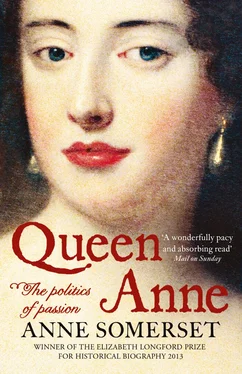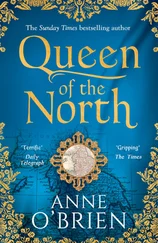The Duchess of Marlborough later recalled that as a young woman ‘the Princess was so silent that she rarely spoke more than was necessary to answer a question’. At fourteen, Anne was already conscious that she was a poor communicator and acknowledged this as a failing, noting ruefully, ‘I have not, maybe, so good a way of expressing myself as some people have’. Four years later she was still lamenting ‘I can never express myself in words’. Even if Anne deprecated her lack of verbal skills, she did not accept that her thoughts and feelings could be dismissed on that account as insignificant, insisting that while ‘there may be people in the world that can say more for themselves … nobody’s heart I am sure is more sincere’. 39Although words did not come easily, her diffidence did not spring from a complete absence of self-esteem, and she prided herself on being a person of sound instincts and honest convictions.
James had by now advanced far down the same spiritual road as his late wife. In 1672 it was noticed that for the first time he did not take the sacrament at Easter. He only ceased attending Anglican services of any kind in 1676, but there could be little doubt that he had, in effect, already abandoned the Church. This had become clear after anti-Catholic feeling had resulted in the passing of the Test Act on 29 March 1673. The bill prevented Catholics from holding official employments in England by insisting that all office holders had to take an oath repudiating the doctrine of transubstantiation ‘in full and positive words’. 40James could not comply with this requirement and consequently had to resign from his position as Lord Admiral in June 1673.
The discovery that the heir apparent to the throne was a Catholic caused the greatest consternation. Fear of Popery was a force whose potency bore no relation to the number of Catholics in England. It is estimated that in 1676 Catholics constituted just over one percent of the population, although admittedly the figure for the peerage would have been higher. The memory of past outrages perpetrated by Catholics was kept alive by vicious propaganda. The events of Mary Tudor’s reign, a hundred and twenty years earlier, were used to stir up dread of the Popish menace. As alarm mounted at the prospect of a Catholic becoming King there were predictions that in that event England would again be subjected to ‘those bloody massacres and inhuman Smithfield butcheries’. It was suggested that James would prove to be ‘Queen Mary in breeches’, while another person warned ‘We must resolve when we have a prince of the Popish religion to be Papists or burn’. 41
Fears did not centre exclusively on the possibility that a Catholic ruler would deny his Protestant subjects the right to practise their faith. There were also secular considerations. Catholicism was seen as an autocratic religion, presided over by a Pope whose authority could not be questioned, and this gave rise to the idea that it had a natural affinity with repressive political systems. The prime example of an illiberal Catholic regime was absolutist France, where King Louis XIV ruled without having to secure the consent of a representative assembly to pass laws or levy taxes. France was very much on everyone’s mind at this time, for it was currently emerging as a new superpower, and its king seemed intent on oppressing his neighbours as well as his subjects. In 1672 he had launched a war of aggression with Holland, intending to crush that republic. Though victory did not come as easily as he had hoped, it was clear he aimed at nothing less than radically altering the European balance of power. It was feared that if James inherited the throne, far from trying to restrain Louis, he would instead emulate him by undermining his subjects’ rightful liberties. It was thought that as a Catholic he would be automatically predisposed to rule arbitrarily, for, as the Earl of Shaftesbury put it, ‘Popery and slavery like two sisters’ went ‘hand in hand’. 42
It took some years before disquiet about James’s religion became so marked that his opponents sought to prevent him becoming King. Since Anne was only eight when her father resigned as Lord High Admiral, it is unlikely that she was aware from the first of the implications of his being a Catholic convert. In time, however, it would define her relations with him.
After being constantly ‘subject to a variety of diseases beyond the endurance of the strongest constitution’ Anne’s brother Edgar had died in June 1671. The loss of what the Venetian ambassador called the ‘sole sprig’ 43of the royal family meant that Anne became a figure of greater significance. She was now third in line to the throne, and since the Queen showed no sign of providing an heir, Anne would not be moved lower down the order of succession unless her father remarried and had a son.
Anne’s education should thus, logically, have been a subject of national concern, and yet it was astonishingly inadequate. She and Mary were entrusted to the care of Lady Frances Villiers and spent much of their time in the crumbling Tudor palace at Richmond the royal governess shared with her husband, the Keeper of Richmond Park. Anne developed a marked ‘fondness for the house … where she … lived as a child’ and, believing ‘the air of that place good for children’, wanted her own son to be brought up there. 44
Royal daughters were no longer accorded the sort of education that had been deemed appropriate when Queen Elizabeth I had been in the schoolroom. Anne’s great grandfather James I of England had believed that it was undesirable to introduce women to the classics. Such views were still so prevalent that even the cultivated diarist and virtuoso, John Evelyn, would pronounce in 1676 that ‘learning does commonly but corrupt most women’, as in their case the study of ancient texts was ‘apt to turn to impertinence and vanity’. Lady Mary Wortley Montagu, who was slightly younger than Anne, observed, ‘There is hardly a creature in the world more despicable or more liable to universal ridicule than a learned woman’. Anne herself appears to have been suspicious of women with intellectual pretensions. The Duchess of Marlborough wrote that one reason Anne did not like her aunt Lady Clarendon was that she ‘looked like a madwoman and talked like a scholar, which the Princess thought agreed very well together’. 45
There was little likelihood that Anne’s father or uncle would try to counter convention by turning her and her sister into paragons of learning. Their own education had been disrupted by the Civil War, and neither James nor Charles was academically minded. The ideas of a former schoolmistress called Bashua Makin, who in 1673 published a pamphlet dedicated to the Lady Mary, would have seemed outlandish to both men. She wanted gentlewomen to be instructed in a wide range of subjects, including mathematics, ancient languages and rhetoric, whereas currently on emerging from the classroom they could only ‘polish their hands and feet … curl their locks … [and] dress and trim their bodies’. 46
The princesses’ parents both spoke French fluently and in that language, at least, the two girls received excellent instruction from a Frenchman, Peter de Laine. As a result when she was Queen, Anne would have no difficulty communicating with French diplomats in their own tongue. 47
Anne was taught enough basic arithmetic to be able to inspect her household accounts on marriage. She was careful about checking these and once picked up a discrepancy after noticing in 1698 that ‘the expenses of oil and vinegar were very extravagant’. Even so, the Duchess of Marlborough maintained that Anne was insufficiently vigilant to detect that her Treasurer of the Household, Sir Benjamin Bathurst, had tried to defraud her. Still less was Anne capable of understanding the complex financial arrangements that underpinned government during her reign. 48
Читать дальше












